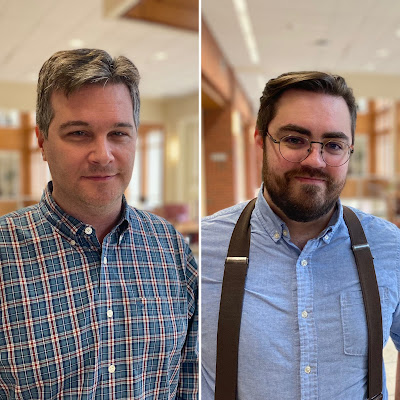Q&A: OU Engineering Students Named 2023 NSF Graduate Research Fellows
The fellowships provide students with a three-year annual stipend, allowance for tuition and fees, and access to opportunities for professional development available to NSF-supported graduate students.
The NSF Graduate Research Fellowship Program is the country’s oldest fellowship program directly supporting graduate students in various science, technology, engineering and mathematics fields. Since 1952, NSF has funded over 60,000 Graduate Research Fellowships out of more than 500,000 applicants. Currently, 42 Fellows have gone on to become Nobel laureates, and more than 450 have become members of the National Academy of Sciences.
OU Engineering interviewed the newest NSF Graduate Research Fellows:
Blake Bartlett, of Greenwood, Arkansas, earned a bachelor’s degree in chemical engineering from Oklahoma State University. He is currently a first-year Ph.D. student in the OU School of Chemical, Biological and Materials Engineering.
How did you come to study at OU? I began talking with Dr. Sepideh Razavi about my current research project before finishing my undergraduate program. My interest in Dr. Razavi’s research is one of the major reasons I came to OU; the other is that my wife is in medical school at the OU College of Medicine.
How will the NSF Fellowship impact your experience? The fellowship helps me financially, but beyond that, it signals to colleagues, mentors and future employers that I am committed to my research and to the pursuit of scientific knowledge.
What kind of research have you been working on? My thesis project focuses on synthesizing bilobal nanoparticles – like two spheres that have been partially fused together – that can be independently functionalized on either side, making them a type of bifunctional Janus particle. I aim to use these particles in cancer immunotherapy by functionalizing one lobe with antibodies for T-cell immune activation and the other with antibodies that bind to specific cancers like leukemia or lymphoma.
What do you hope to do upon graduation? I hope to become a professor in chemical engineering so that I can continue pursuing research and teach some of the principles that make the field so interesting.
Cora DeFrancesco, of New Bloomfield, Pennsylvania, earned a bachelor's degree in mathematics in 2019 and a bachelor's in astrophysics in 2021, both from OU. She is currently working on a master's degree in the OU School of Electrical and Computer Engineering.
How did you come to study at OU? I received a National Merit Scholarship.
How will the NSF Fellowship impact your experience? This Fellowship allows me to pursue my own independent research.
What kind of research have you been working on? My NSF Graduate Research Fellowship proposal focused on combining the power of distributed navigation and synthetic aperture radar imaging techniques as a translatable technology and testbed for future space-based radio telescope missions.
What do you hope to do upon graduation? I currently am a master’s degree student advised by Dr. Jay McDaniel, and I plan to continue my Ph.D. studies at OU after earning my master’s degree.
Rylee Newport, of Yukon, Oklahoma, will earn a bachelor's degree in biomedical engineering from OU in May 2023. She will continue her studies at the University of South Florida.
How did you come to study at OU? Growing up in Oklahoma, I always knew I wanted to come to OU. I was drawn to the strong biomedical engineering program and the community on campus.
How will the NSF Fellowship impact your experience? The NSF Fellowship will have a big impact on my future graduate school experience by providing additional professional development opportunities and freedom in choosing future research projects.
What kind of research have you been working on? For the past two years, I have focused on substrate optimization for tunable expansion microscopy in Dr. Stefan Wilhelm’s Biomedical Nano-Engineering Laboratory. The goal of my project is to develop a method that allows for improved visualization of nanoparticle cell interactions. This information can improve the understanding of how nanomedicine interacts with cells in an environment that better mimics the innate biological conditions and how nanoparticles distribute in cultured cells.
What do you hope to do upon graduation? After graduating in May 2023 with a bachelor’s degree in biomedical engineering, I will pursue a Ph.D. in biomedical engineering.
Other OU recipients hail from the Dodge Family College of Arts and Sciences and the Mewbourne College of Earth and Energy. They are:
- Jamie Boyd will earn bachelor's degrees in physics and French from OU and will pursue a graduate degree in atomic, molecular and optical physics.
- Emily Luschen earned a bachelor's degree in meteorology from OU and now is pursuing a graduate degree in physical and dynamic meteorology.
- Carly Wickizer earned bachelor's degrees from the University of Central Oklahoma and now is pursuing a graduate degree in chemical theory, models and computational methods at OU.
- Advika Kamatar earned a bachelor's degree in biomedical engineering at OU and now is pursuing a graduate degree at the University of Texas at Austin.
- Nathan Preuss earned bachelor's degrees in both computer science and economics from OU and now is pursuing a graduate degree at Cornell University.
- Rachel Sharp earned a bachelor's degree in psychology from OU and now is pursuing a graduate degree at the University of North Carolina at Chapel Hill.
- Simon Avery Vigil earned bachelor's degrees in both linguistics and chemistry from OU and now is pursuing a graduate degree at Duke University.
By Victoria Stephens, Gallogly College of Engineering



